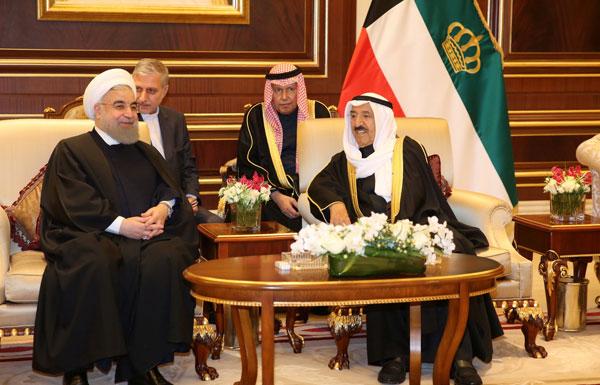You are here
Trump fears may thaw Iran, Gulf relations — analysts
By AFP - Feb 16,2017 - Last updated at Feb 16,2017

Iran’s President Hassan Rouhani meets with Emir of Kuwait Sheikh Sabah Al Ahmad Al Sabah in Kuwait City, Kuwait, on Wednesday (Reuters photo)
TEHRAN — Shared fears over US President Donald Trump's policies could bring Iran and Gulf Arab countries closer together, analysts said after a fence-mending regional tour by Iranian President Hassan Rouhani.
Rouhani's visit Wednesday to Oman and Kuwait follows years of rising tensions between Iran and its Gulf Arab neighbours, fuelled by the conflicts in Syria and Yemen where they back opposing sides.
In stark contrast to some of the previous blame-trading, Rouhani struck a conciliatory tone during his short trip, which did not include a stop in arch-rival Saudi Arabia.
"Today we must all stand side-by-side as Muslim brothers and confront divisive ideas," Rouhani told Kuwait's Emir Sheikh Sabah Al Ahmad Al Sabah, quoted by Iran's state news agency IRNA.
"All existing differences can be resolved through dialogue among the regional countries."
Kuwait, which unlike many of its neighbours has maintained relations with Tehran, last month launched a dialogue with the Islamic republic to normalise Iran-Gulf ties.
Iran also has good relations with Oman where Rouhani was warmly welcomed by Sultan Qaboos, whose country has played a role in the past as a key mediator between the Islamic republic and the West.
Tehran's ties with other Gulf states have been strained over its support for the Syrian regime of Bashar Assad and its alleged backing of Yemen's Houthi rebels.
Trump's radical positions
Rouhani's trip came less than a month after Trump took office, bringing a wave of unpredictable policies, notably a visa ban on citizens of seven Muslim-majority nations, including Iran, Iraq and Yemen.
He also stirred controversy with campaign rhetoric that critics denounced as anti-Muslim.
“The new US administration has a radical position towards Islamic countries and may make dangerous moves against regional nations, including Iran,” Iranian analyst Samad Ghaempanah told AFP.
Trump’s rhetoric has forced Iran’s diplomatic apparatus “to take initiatives to once again restore its relations with its neighbouring countries,” said Ghaempanah, a professor in international relations.
“It seems that all of the countries in the region are facing a general threat, and it’s a good opportunity for Muslim countries to come closer,” he added.
“It can be a significant step and these countries can mediate so that other countries that have tensions with Iran — like Qatar, the United Arab Emirates, Bahrain and Saudi Arabia — can take positive steps for dialogue and negotiations leading to increased unity... in the region against US threats.”
A Gulf Cooperation Council summit held in Manama in December asked Kuwait to initiate contacts with Tehran to start a dialogue to improve ties.
That led to the Kuwaiti emir sending a letter to Tehran last month.
“The Kuwaitis can definitely play an important role as Iran recognises Kuwait as its friend and the Kuwaitis as trustworthy,” the former Iranian ambassador to Kuwait wrote in a note in the reformist Etemad daily on Thursday.
The trip sends a signal to the region that “Iran is interested in talking and ready to resolve the differences”, wrote Reza Mirabian.
A lack of cooperation among the Gulf countries “brings foreigners, including the US, Britain and Israel to the region, which is not something Iran is interested in”, he said.
But prominent Kuwaiti political analyst Sami Al Nasef said the success of Tehran’s initiative depended “on Iran’s actions rather than slogans”.
“Iran is now interfering in Iraq, Syria and Yemen... and is backing [Shiite] militias in several countries in the region,” he told AFP.
Tensions between Tehran and Riyadh have also been fuelled by the annual Hajj in Saudi Arabia.
Iranian pilgrims were absent last year for the first time in three decades after the two regional rivals failed to agree on security and logistics following the deaths of 464 Iranians in a stampede at the 2015 Hajj.
Last month, Tehran said it had received an invitation from Saudi Arabia for its pilgrims to attend this year.
Related Articles
TEHRAN — Iranian President Hassan Rouhani is to visit Oman and Kuwait on Wednesday, state television reported, amid efforts by Kuwait to men
DOHA — Kuwait's foreign minister will make a rare visit to Tehran on Wednesday to deliver a message to President Hassan Rouhani on a "basis
In an attempt to allay Arab concerns about his country's role in the region, Iranian Parliament Speaker Ali Larijani said Wednesday that Tehran's assistance to the Iraqi people in confronting Daesh group, has prevented more countries from being threatened by Daesh terrorism.
















